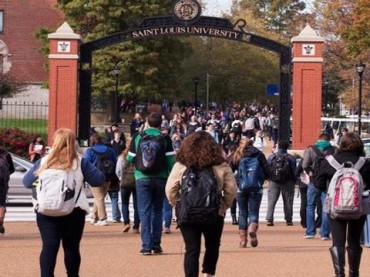
ST. LOUIS, Mo. – After the grand jury decision that police officer Darren Wilson would not be indicted for the shooting death of Michael Brown, protests choked with angry college students erupted on campuses across America.
Yet on that same night, a university just 10 miles outside Ferguson was calm and quiet. A peaceful, 30-minute prayer rally at Saint Louis University drew about 40 people, but other than that, the campus was eerily serene.
This despite Saint Louis University administrators emailing protest tips to the campus community ahead of the decision, and the Revolutionary Communist Party doling out pamphlets near campus that aimed to incite a riot among students after the decision became public.
While it is somewhat ironic that the nearest major university to Ferguson was a place of calm and quiet while others had raucous demonstrations, in interviews with The College Fix this week, several students offered ideas as to why: Ferguson fatigue.
“We are so close to what is going on,” freshman Zach Heinricher said. “We hear about it every day, and we see it. … It got old.”
Saint Louis University has spent this semester caught in the eye of Ferguson’s storm. Having been inundated with the issue for months, students are burnt out. Last week, no protests took place. This Monday, a 35 person “die-in” occurred. Otherwise, most SLU students have gone about their school week as usual.
“(Fatigue) is a natural response to something so big,” freshman Dinesh Jaswal said.
Some suggest part of the fatigue can be attributed to that fact that the debate has deadlocked on campus.
“People keep saying the same things over and over again,” Jaswal said.
Heinricher said opinions were pretty strong, few were in the middle. With that, minds were made up.
“People like to have a strong opinion, and I think that can get in the way of really thinking about it,” he said.
A common complaint has been that the loudest voices on campus have tuned out opportunity for actual dialogue with peers who may hold different opinions.
“The problem with those louder voices is they tend to draw out the worst in people. It creates animosity on both sides and dialogue ceases,” senior Scott Rupp told The College Fix.
The fatigue has come in different forms for different students. Darren Wilson supporter Kyle Gettemeier expressed frustration with constantly explaining himself to others.
“I’m fatigued in the sense that I’m tired of dumb people,” the freshman told The Fix. “I feel like I carry on conversations with people who don’t really understand. They think they know what they are talking about, but a lot of time they don’t.”
Senior Pat Lally said his fatigue “stems from people refusing to acknowledge the evidence presented to the grand jury.”
“It’s just frustrating when people don’t listen,” he said.
Also playing into the Ferguson fatigue is the fact that Saint Louis University hashed out race issues of its own during October in a six night sit-in called “Occupy SLU.”
It came about as the result of protests following another police-related shooting in the nearby Shaw Neighborhood of St. Louis, but also protesters – many of whom were not students – accused Saint Louis University of being a campus steeped in white privilege.
The occupiers left the campus after SLU’s president, Dr. Fred Pestello, agreed to their demands. The university promised an increased budget for the African American studies program, more financial resources to retain African American students, establishment of a community center, and development of an academic “Center for Community and Economic Development.”
There were mixed reactions to that outcome, with some who believe the university did the right thing and others who thought officials caved. Reflecting this week on the October sit-in, students still expressed concern that protesters misrepresented the urban campus as a place of “white privilege.”
“People really do like to stereotype a SLU student,” Heinricher said. “You (shouldn’t) assume that these kids are ‘white privilege’ or don’t care about minorities.”
Rupp emphasized that protesters mistakenly categorized students as a whole.
“People focused on the SLU populous, and not what the SLU populous is doing with the advantages or disadvantages that they come into this university with,” he said.
For Gettemeier, such “white privilege” is misrepresenting because he said it doesn’t exist.
“Personally, I don’t believe in white privilege. I don’t believe in the concept of it,” he said. “I grew up in a lower-class family. I think that SLU does a hell of a lot to get people here from all walks of life. I wouldn’t be here if they didn’t do as many things as they did.”
College Fix reporter Nathan Rubbelke is a student at Saint Louis University.
Like The College Fix on Facebook / Follow us on Twitter
IMAGE: Facebook screenshot





Please join the conversation about our stories on Facebook, Twitter, Instagram, Reddit, MeWe, Rumble, Gab, Minds and Gettr.